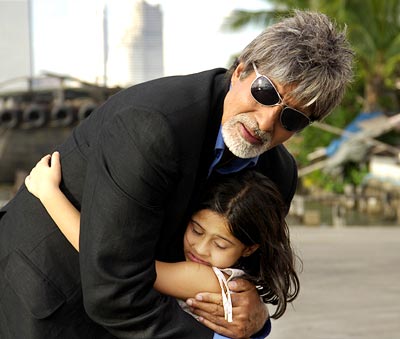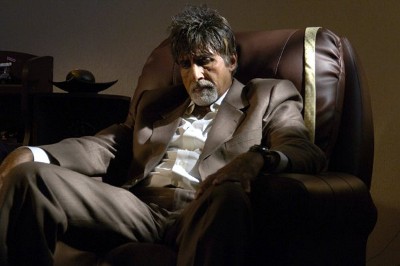|
|
|
 |
Ek Ajnabee
|
 |
| |
Producer: Bunty Walia, Jaspreet Singh Walia
Director: Apoorva Lakhia
Starring: Amitabh Bachchan, Arjun Rampal, Rucha Vaidy, Perizaad Zorabian, Vikram Chatwal, Raj Zutshi, Akhilendra Mishra, Dayashankar Pandey, Aditya Lakhia
Music: Amar Mohile
Lyrics: Sameer, Jaideep Sahni, Vishal Dadlani and Lalit Ti
Genre: Action
Recommended Audience: Adult
Film Released on: 09 December 2005
|
Reviewed by: Lidia Ostepeev - Rating: 6.0 / 10
 |
|
|
 |
 |
 |
 Let us know what you think about this review Let us know what you think about this review
|
| Public Rating Average: 5.11 / 10 (rated by 410 viewers) |
  When Bollywood borrows from Hollywood it´s nice to think that value has been added to the movie; that a film´s ideas have received a cultural make-over and a fresh perspective through the inclusion of songs. Ek Ajnabee, which borrows substantially from Tony Scott´s Man on Fire (2004), does not present a potentially gripping story about kidnapping, in an original or interesting way, even though it offers some very good performances. When Bollywood borrows from Hollywood it´s nice to think that value has been added to the movie; that a film´s ideas have received a cultural make-over and a fresh perspective through the inclusion of songs. Ek Ajnabee, which borrows substantially from Tony Scott´s Man on Fire (2004), does not present a potentially gripping story about kidnapping, in an original or interesting way, even though it offers some very good performances. Ironically, most of the elements that work in Ek Ajnabee appear in Scott´s film and do not come from the uninspired adjustments made by the Lakhia-Tyagi screenplay. Man on Fire was ripe for a Bollywood "make-over" because of its strong emotional core. In this case, a troubled army veteran (Amitabh Bachchan) is hired by a wealthy couple to guard their child (Rucha Vaidy) from kidnappers in dangerous Bangkok. Curiously however, the filmmakers have decided to keep the Bollywood version neutral in terms of both the Thai and Indian cultures.
The girl´s parents are modern, cosmopolitan individuals, the setting is travelogue-inspired Bangkok and matters of culture and religion are brushed over to the film´s detriment. It´s not enough that seasoned viewers of Bollywood cinema will connect with the Bachchan icon and automatically know that the little girl´s protector is probably traditional at heart with strong religious or spiritual beliefs. The film itself needs to establish this, through better imagery or more subtle characterization and not rely on the strength of the actor or a few flimsy, ill-placed flash-backs.  It´s in the second half, that the full effects of cultural detachment become apparent. Once the child is kidnapped and the warm, fuzzy relationship between bodyguard and charge is overtaken by his urge to punish those responsible, we are out of the mansion and into the streets of Bangkok. Scott researched mafia-police collusion in Mexico before he made his film, providing it with a biting, authentic sub-plot capable of filling the void created by the absence of the little girl. In the Bollywood version, which was filmed in a bit more than 30 days, there is no real sense of place, or sufficient intrigue to sustain viewer attention. The Thai police are bland, stereotypical characters played poorly by inexperienced actors. Busy camera-work coupled with irrelevant use of the setting becomes rather self conscious and distracting. Yes, we are in Thailand and it´s Buddhist, but why all the arty shots of shrines and temples if they don´t connect with the characters or contribute to the mood of the story? It´s in the second half, that the full effects of cultural detachment become apparent. Once the child is kidnapped and the warm, fuzzy relationship between bodyguard and charge is overtaken by his urge to punish those responsible, we are out of the mansion and into the streets of Bangkok. Scott researched mafia-police collusion in Mexico before he made his film, providing it with a biting, authentic sub-plot capable of filling the void created by the absence of the little girl. In the Bollywood version, which was filmed in a bit more than 30 days, there is no real sense of place, or sufficient intrigue to sustain viewer attention. The Thai police are bland, stereotypical characters played poorly by inexperienced actors. Busy camera-work coupled with irrelevant use of the setting becomes rather self conscious and distracting. Yes, we are in Thailand and it´s Buddhist, but why all the arty shots of shrines and temples if they don´t connect with the characters or contribute to the mood of the story? Worse still, because of insufficient depth and texture in the screenplay to harness, or off-set Surya´s rage, his graphic forays into interrogation and torture appear gratuitous. The bodyguard´s internal landscape is dark and disturbed but the visuals of the film don´t really go there - not even during the songs. Instead it´s all rather bright and colorful, projecting almost a boyish glee at the various forms of torture visited upon the criminals; one of whom wears "smiley boxers" during a particularly nasty assault on his lower body.  The first half of the film moves slowly but works better because its focus is narrower and Bachchan and the Rucha Vaidy (the child) work so beautifully together. Perizaad Zorabian as the distraught mother makes a strong impression in a passionate role. These characters´ strengths are a combination of the actors´ skills and ideas gleaned from the American screenplay. Arjun Rampal, as Surya´s ex- army colleague has less material to work with. His part has been extended by the Lakhia-Tyagi writing team but not deepened, even though he gets to do a raunchy nightclub number and a bit of gratuitous street fighting. Even so, the actor makes the most of it. The first half of the film moves slowly but works better because its focus is narrower and Bachchan and the Rucha Vaidy (the child) work so beautifully together. Perizaad Zorabian as the distraught mother makes a strong impression in a passionate role. These characters´ strengths are a combination of the actors´ skills and ideas gleaned from the American screenplay. Arjun Rampal, as Surya´s ex- army colleague has less material to work with. His part has been extended by the Lakhia-Tyagi writing team but not deepened, even though he gets to do a raunchy nightclub number and a bit of gratuitous street fighting. Even so, the actor makes the most of it. The three song soundtrack by Amar Mohile is not particularly significant apart from Tere Liye, which is used to accentuate Surya´s sense of loss as he contemplates the kidnapped child´s diary. Music and narrative blend nicely at this point but the nightclub song seemed pointless; so unlike the gritty cabaret numbers in Aks (2001) which demonstrate the potential that songs have to tease out what´s happening in the minds of characters.
Apart from some great performances, Ek Ajnabee shows that without considerable creative input, the hollow replication of borrowed ideas can have adequate, but not spectacular results.
|
|
|


